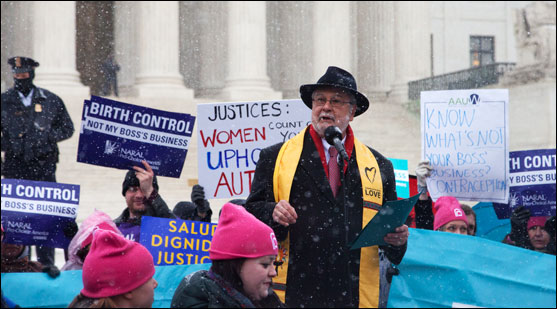
Morales champions reproductive rights outside Supreme Court
Peter Morales claims access to contraception is “a constitutionally protected right to religious freedom.”
“From the theological diversity found in every single UU congregation across this country to the gifts of pluralism and democracy in our society, Unitarian Universalists and other people of faith are here in numbers this morning to say: ‘We have a constitutionally protected right to religious freedom, too,’” Morales told a crowd of about 600 outside the high court.
In two related cases, Sebelius v. Hobby Lobby Stores, Inc. and Conestoga Wood Specialties Corp. v. Sebelius, two national, for-profit companies are claiming that they have a right to religious freedom that would be violated if they are required to provide certain types of contraception—namely, the morning-after pill and IUDs—under the basic insurance plan mandated by the Affordable Care Act. The UUA joined with other progressive religious organizations to oppose this argument, including signing on to an amicus curiae brief supporting reproductive rights.
“We are here to send a message to the Supreme Court and across the country: the time must come when you can no longer control other people’s bodies. The time must come when you will not be able to regulate other people’s spiritual and religious beliefs,” Morales said. “My prayer is that that time is now!”
Morales also gave the opening remarks at an interfaith rally, organized by the Religious Institute, that took place earlier Tuesday morning in a nearby Lutheran church, and which included a number of liberal religious groups.
“Managers at Hobby Lobby have the right to their own beliefs about birth control but they have no right to impose those beliefs on their employees, some of whom may be Unitarian Universalist or any other religion,” Morales told this group. “Some of Hobby Lobby’s employees, like many here today, ground their use of birth control and their commitment to widespread access to family planning in deeply held religious values.
The Rev. Debra Haffner, a UU minister and president and CEO of the Religious Institute, said the two cases have critically important implications. “Our position is that only individuals have religious freedom, and that all the women who work for Conestoga and Hobby Lobby should be able to exercise their religious freedom based on their own faith,” Haffner said.
She emphasized that it was important to include the voice of the progressive interfaith community among others opposing the Hobby Lobby position. “The secular organizations’ message was that [my reproductive choices are] not my bosses’ business,” she said. “I think we felt it was important to have a clear faith-based message, which is that religions support universal access to contraception, and contraception is a moral good.”
Questioning by the justices during oral argument Tuesday seemed split along ideological grounds, according to news reports, with the conservative bloc appearing supportive of the Hobby Lobby position. According to National Public Radio’s Nina Totenberg, the three women justices seemed to side with the contraception mandate, while the male justices were “more skeptical.” The Court’s decision is expected in June.
Photograph (above): UUA President Peter Morales addresses the rally in front of the Supreme Court of the United States (Scott Henrichsen Photography). See sidebar for links to related resources.
Comments powered by Disqus






